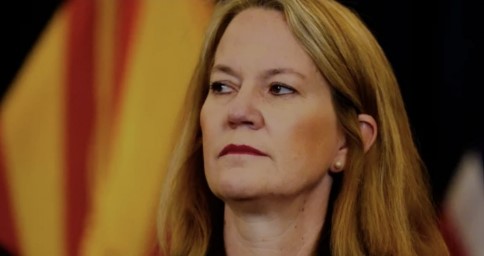
by Staff Reporter | Jan 29, 2026 | News
By Staff Reporter |
The Tucson Pride organization will be shutting down after nearly 50 years of existence.
The organization maintained the third-oldest Pride entity in the country, and the first and oldest one in Arizona.
The announcement comes exactly a month before the organization was slated to have its annual pride festival.
The Tucson Pride Board of Directors said in an announcement that it would refund all funds received for this year’s festival within 30 to 90 days.
“This decision was not made lightly. We recognize the deep importance Tucson Pride has held in our community since 1977, serving as a space of visibility, advocacy, celebration, and resilience for nearly five decades,” stated the organization on its Facebook page and website. “We are profoundly grateful to every volunteer, sponsor, artist, activist, and community member who has supported Tucson Pride throughout its history.”
Tucson Pride was founded following the murder of Richard Heakin in 1976 outside Stonewall Tavern.
The organization’s nonprofit status (Tucson Lesbian and Gay Alliance) was jeopardized in the recent past for failing to file on time. The IRS automatically revoked their nonprofit status in May 2024 for failing to file their tax returns for three consecutive years.
Tucson Pride said one of their prior board members “missed” the 2021 and 2022 tax filings. They did not name the prior board member allegedly responsible for the missing filings.
According to their latest available filing from 2020, the board of directors at the time included Rocque Perez.
Perez is a state senate candidate and a formerly appointed member of the Tucson City Council. AZ Free News reported on the recent discovery of Perez’s deletion of his pornographic and violent social media accounts.
Other directors per that last 2020 filing included Samantha Cloud (president), Jeff Myers-Fulgham (vice president), Stephen R. Myers-Fulgham (treasurer), and Matthew Taylor (secretary).
Tax filings revealed the Tucson Lesbian and Gay Alliance had a significant dropoff in revenue between its 2019 and 2020 filings. The 2020 reported revenue ($18,400) was $28,800 lower than its lowest revenue over the past decade of available reports, dating back to 2010.
Prior to 2020, the organization had reported a steady rise in revenue from 2015 to 2019, having a reported revenue high of $171,000 before the 2020 decline.
The organization had a steady rise in revenue from 2016 to 2019.
Last October, Tucson Pride leadership delayed its Pride festival due to financial problems and political pressures. The organization reported having over $50,000 in debt following a slash to ticket sales and donations after 2024.
“Nationwide, LGBTQIA+ nonprofits have seen donations and corporate sponsorships decline due to shifting politics and increased hostility toward queer causes,” said the board. “Tucson Pride has felt this squeeze firsthand, making local fundraising more challenging than in past years.”
A 2024 financial overview provided by Tucson Pride reflected that gross earnings totaled over $110,000, but their expenses totaled nearly $156,000: $37,000 on entertainment; $7,000 on food, beverage, and ice; $50,000 on infrastructure; $5,000 on logistics; $2,000 on marketing; $7,000 on permitting; $27,000 on public safety; $5,000 on tech; $1,000 on a Tihan donation; and $13,000 on supplies.
Cash sponsorships totaled just over $54,000, and festival sales totaled $63,000.
AZ Free News is your #1 source for Arizona news and politics. You can send us news tips using this link.

by Matthew Holloway | Jan 29, 2026 | News
By Matthew Holloway |
The Arizona Republican Party’s annual meeting on this past Saturday drew less robust attendance than expected and was characterized by prolonged delays and organizational challenges, even as delegates elected Sergio Arellano as the party’s new chair.
The meeting, held in Prescott Valley, was scheduled to conclude by approximately 5 p.m. but it extended into the evening as party officials conducted hand counts and resolved procedural disputes. Leadership results — including the chair’s race — were not announced until after 8 p.m.
The Epoch Times Arizona reported that the meeting was “over an hour late getting started,” and noted rising tensions inside. Covering the opening remarks by former-Chair Gina Swoboda, the outlet wrote, “Swoboda is effectively filibustering while the meeting can’t officially begin—opening with a unity pep talk amid ongoing controversy over her and school choice.”
Several attendees described the meeting environment and turnout on social media. Independent journalist Christy Kelly wrote, “FACT: The turnout for the AZGOP state meeting was significantly depressed,” responding to a post from gubernatorial candidate Karrin Taylor Robson, who described the turnout as “amazing.”
Columnist Rachel Alexander noted the significant delay in her coverage via X, writing, “The AZGOP’s election is now going on at 6:20 pm (it’s supposed to be over by 5 pm, started at 8 am).”
Delegates conducted leadership elections during the meeting. After two rounds of voting for state party chairmanship, Sergio Arellano, an Army combat veteran and Republican activist, won the runoff against former First Vice Chair Pam Kirby. Arellano succeeds Gina Swoboda, the outgoing chair, who is pursuing a Congressional Campaign in Arizona’s District 1.
Before voting commenced, delegates debated whether to seat 16 “fractional” state committeemen whose party positions had been challenged under interpretive readings of the bylaws. The floor ultimately voted to seat those members, allowing the leadership election to proceed without a formal challenge.
The prolonged process included a full hand count of ballots for multiple leadership roles, as well as reportedly 20 proposed bylaw changes, which contributed to the extended meeting timeline. As reported by the Epoch Times Arizona, debate on the bylaw changes was prohibited, allowing “no member discussion, no back-and-forth, no amendments from the floor.”
The outlet noted, “People in the room are visibly upset and uncomfortable about the decision to move forward with zero debate on such a large set of changes.”
Over forty minutes after the meeting’s conclusion at 8 p.m., Garret Archer, Data and Political Analyst for ABC15, wrote, “Only a few state committee members are left waiting for the results of the runoff chair vote.”
Matthew Holloway is a senior reporter for AZ Free News. Follow him on X for his latest stories, or email tips to Matthew@azfreenews.com.

by Ethan Faverino | Jan 29, 2026 | News
By Ethan Faverino |
Arizona Senator Carine Werner (R-LD4) renewed her demand for transparency and accountability within the Arizona Health Care Cost Containment System (AHCCCS) before the committee’s latest special oversight hearing on Thursday, January 29th.
Following months of intense investigation—including multiple hearings, extensive document requests, and sworn testimony—the committee has uncovered persistent systemic failures at AHCCCS that continue to undermine Arizona’s provider network and block vulnerable patients from accessing essential care.
Providers remain unable to fully participate in the system, with critical services constrained and families in crisis struggling to access timely and appropriate care. “This is no longer just a policy failure. It’s a public health and safety crisis,” stated Senator Werner. “Decisions made inside AHCCCS dismantled parts of our provider network and robbed Arizonans of the care they desperately need. Leadership appearing before the committee has repeatedly failed to provide clear, complete answers regarding enforcement decisions, provider terminations, and the internal actions taken after billions of dollars in Medicaid fraud were uncovered.”
During the current legislative session, Werner has introduced several bills to improve oversight, reinforce accountability, and require AHCCCS and the Arizona Department of Health Services to fulfill their obligations to patients, legitimate providers, and Arizona taxpayers.
While expressing cautious optimism regarding the leadership of the newly appointed AHCCCS director, Senator Werner emphasized that personnel changes alone are insufficient to resolve the deep-rooted issues uncovered by the committee’s ongoing investigation.
“The committee remains cautiously optimistic that newly appointed Director Ginny Rountree can begin stabilizing the agency, but the oversight record makes clear that leadership changes alone will not resolve the systemic breakdown exposed through the investigation,” explained Werner. “The Senate Health & Human Services Committee will continue its work until access to care is restored, trust is rebuilt, and meaningful accountability is achieved within Arizona’s Medicaid system.”
Ethan Faverino is a reporter for AZ Free News. You can send him news tips using this link.

by Staff Reporter | Jan 28, 2026 | News
By Staff Reporter |
The man arrested for a deadly shooting at a Phoenix gas station was released from a weapons charge five years ago.
This occurred under the watch of Attorney General Kris Mayes’ former division chief Vanessa Hickman when she was city attorney for the city of Peoria. Hickman worked nearly three years in Mayes’ office before her arrest last November by federal agents on felony charges of mail theft.
Hickman was accused of stealing and selling several pieces out of $40,000 worth of fine jewelry misdelivered to her in the mail.
Under Hickman in September 2020, city of Peoria prosecutors dismissed a charge against Deondre Stephen Franklin for carrying a deadly weapon while under 21 years old. Franklin, now 25, also faced a charge of underage drinking at the time in the Peoria Municipal Court.
Court records show the court allowed Franklin to undergo substance use evaluation and education rather than sentencing him to jail time. Like Franklin, court records revealed Hickman underwent an outpatient substance abuse program while working for Mayes. Hickman had a DUI charge in 2003.
Divorce records allege that on multiple occasions Hickman drove drunk and would pour hard liquor into her coffee in the mornings.
The weapons charge Franklin faced was a class three misdemeanor, which could have resulted in up to 30 days in jail, up to $500 in fines, and up to a year of probation.
Hickman stepped down following the 2022 election of Mayor Jason Beck. Hickman joined the city in 2018.
Mayes hired Hickman despite warnings from the city of Peoria about other allegations against Hickman relating to fraud, conversion, and breach of fiduciary duty. The city sued Hickman following her departure over a disputed severance payment.
It appears Hickman’s direction for prosecuting criminals in Peoria has now resulted in the loss of at least one innocent life.
Last Friday, Franklin shot 52-year-old Danny Lyn Kaster at a QuikTrip gas station. Franklin reportedly shot Kaster after Franklin attempted to cut ahead in a line for the restroom.
Phoenix police arrested Franklin on Sunday. He faces a second-degree murder charge and a bond of $1 million.
An update from one of Kaster’s friends, Jasen Szczepaniak, relayed what Kaster’s sister said in a Facebook post that Kaster was shot at least four times.
“[Franklin] is a 24-25yr old punk ass wannabe gangster that had a gun,” said Szczepaniak. “Danny said ‘line is back there’ gunman pulled out [a] gun [and] shot him in face, chest, leg as of now 4 shots but autopsy may show more. Deondre Franklin is his name[;] he shot & killed Danny over a bathroom being told to go to [the] back of a line. I’m so grateful he was in custody swiftly, I will make sure the courts/judges know how worthy your life was & will make sure he gets [the] maximum sentence. Doesn’t bring you back doesn’t help make any sense of this but I’m happy he was caught.”
Other friends noted that Kaster was a “dear friend” known for his acts of generosity and kindness.
Kaster’s loved ones recounted that his love for family extended to the animals in his life — especially including his dog, Max. Kaster’s sister reportedly plans to take care of his dog.
A GoFundMe for Kaster’s family is collecting funds to handle funeral expenses.
Although Franklin is in custody, the shooting remains under investigation. Those who may have more information about the shooting should call Silent Witness at (480) 948-6377.
AZ Free News is your #1 source for Arizona news and politics. You can send us news tips using this link.

by Matthew Holloway | Jan 28, 2026 | News
By Matthew Holloway |
State Rep. John Gillette (R-LD30) recently posted a series of messages alleging that some Arizona Democratic lawmakers accepted endorsements from the Communist Party and have not renounced them. His comments came as protests over federal immigration enforcement continued in Phoenix and across the state.
Gillette cited photos in the Arizona Republic, which depicted demonstrators carrying red banners emblazoned with the hammer and sickle, an internationally recognized symbol of communism, during an anti-immigration enforcement protest outside the State Capitol in Phoenix on January 23.
In his social media posts, Gillette asserted that several Democratic members of the Arizona Legislature had received endorsements from the Communist Party and noted that “none of the elected Dems renounced the Communist endorsement,” though his posts did not specify which lawmakers he referenced.
As previously reported by AZ Free News, Arizona Reps. Mariana Sandoval (D-LD23) and Lorena Austin (D-LD9) were both endorsed by the Arizona Working Families Party (WFP), which, according to its website, describes itself as “building our own party on top of the two-party system in the United States,” and “organiz[ing] outside the two parties.”
In July 2025, AZ Free News reported that the WFP also endorsed Democrat Congresswoman Adelita Grijalva during her candidacy in the special election as well as socialist New York City Mayoral Candidate Zohran Mamdani.
Responding to a commenter who shared imagery of Communist Party founder Vladimir Lenin gleaned from a Working Families Party post, Gillette noted: “They took that down after the original posting. I can work with a Kennedy dem… sure they like big govt, taxes, welfare state, but they can be reasonable and dont [sic] hate America like these woke progressive Communists.”
Gillette’s remarks drew attention against a backdrop of Arizona’s ongoing political debates over immigration, federal enforcement, and state-federal relations. Responses from Arizona legislative Democrats to Gillette’s endorsement claims were not contained in his posts, and follow-up statements from affected lawmakers were not immediately available.
In recent weeks, multiple gatherings have taken place in Phoenix opposing ICE activity and federal immigration enforcement. Dozens of protesters gathered outside an ICE field office near 7th Avenue and Montecito calling for the agency to stay out of Arizona after federal immigration enforcement actions sparked nationwide pushback. Demonstrators marched toward downtown Phoenix as part of the event.
Earlier in January, activists in Phoenix held demonstrations outside an ICE office following the fatal shooting of Renée Nicole Good by an ICE agent in Minneapolis, joining similar demonstrations in other cities in Arizona.
On January 20th, roughly 200 protesters participated in a nationwide “Free America Walkout” demonstration at the Arizona State Capitol, marked by chants, poetry, and marches around the Capitol grounds. Organizers framed the protest as part of broader national actions coinciding with the anniversary of Trump’s second inauguration.
In the Phoenix area and at nearby university campuses, youth and students also participated in walkouts and demonstrations calling for limits on federal immigration enforcement and criticizing ICE, including protests featuring chants against the agency and President Trump.
The rallies in Phoenix reflect a broader pattern of protests and demonstrations nationwide this month, including protests involving activist groups identifying as socialist or communist, in response to federal immigration enforcement actions and fatal shootings involving ICE agents. National coverage from Fox News noted coordinated events in multiple U.S. cities, with activist groups staging protests in opposition to ICE operations and Trump administration policies.
Matthew Holloway is a senior reporter for AZ Free News. Follow him on X for his latest stories, or email tips to Matthew@azfreenews.com.

by Ethan Faverino | Jan 28, 2026 | Economy, News
By Ethan Faverino |
Arizona State Representative Chris Lopez (R-LD16) introduced House Bill 2826, which would exempt materials such as concrete, used in the improvement and maintenance of agricultural irrigation canals, from Arizona’s transaction privilege tax on prime contracting.
The “No Tax on Concrete” bill aims to reduce costs for farmers, strengthen water conservation efforts, support food affordability, and boost irrigation efficiency by conserving water resources critical to Arizona’s agricultural sector as the state faces ongoing water security challenges.
Specifically, HB 2826 would establish a targeted exemption under the prime contracting classification in ARS § 42-5075 for materials and supplies used to improve and maintain ditches, irrigation lines, and canals on agricultural lands.
Concrete-lined canals offer significant benefits over traditional unlined earthen canals. Unlined systems can lose 30%-50% or more of conveyed water volume to seepage into permeable soils.
By contrast, concrete lining reduces these losses dramatically, increases flow velocity, minimizes erosion and weed growth, and lowers long-term maintenance needs. Such projects can save thousands of acre-feet of water annually, providing a highly cost-effective approach to water conservation.
Projects funded by the Water Infrastructure Finance Authority of Arizona (WIFA) and awarded to irrigation districts—Buckeye Water Conservation & Drainage District, San Carlos Irrigation & Drainage District, and Roosevelt Irrigation District—are anticipated to conserve between 135,000 and 368,864 acre-feet over their lifetimes, at only an estimated cost of $2 to $3 per acre-foot.
“The House Republican Majority Plan is focused on affordability, and that starts with food on the table and the cost of water to produce that food,” stated Rep. Lopez. “Converting dirt canals to concrete-lined canals saves thousands of gallons of water, which reduces pumping costs, energy, and other expenses that go into the price of food. Eliminating the tax on concrete and other contracting costs to convert these canals to concrete lining not only helps to reduce the costs even further but also helps to conserve water at a time when water conservation has never been more critical for our state.”
Ethan Faverino is a reporter for AZ Free News. You can send him news tips using this link.






